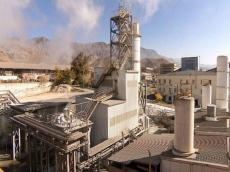|
|
TODAY.AZ / Society
Armenia must change its behaviour, draw conclusions from global protests
15 July 2023 [07:00] - TODAY.AZ
 By Azernews
By AzernewsVarious crimes of Armenia continue at a slow but steady pace. The Yerevan government, which ranks first in cruelty against both humanity and nature, continues its illegal actions as well as ignoring the international law. We are talking again about the metallurgical plant that Armenia started to build illegally in Arazdayan, bordering the Nakhchivan Autonomous Republic (AR). Detailed comments about the fact that the construction of that plant does not comply with the UN Espoo Convention, as well as the flow of serious toxic substances in the waters of the nearby Araz River, which will cause serious consequences, were also reported in previous articles.
Even some time ago, non-governmental organizations unanimously protested worldwide against the ecocide committed by Armenians.
However, Armenia, which is emboldened by some foreign forces, continues its illegal activities, giving no single attention to protests.
Since the plant is built in the area near the Araz River, which passes through the territory of neighboring countries, it poses a serious threat to the territory of Azerbaijan as well as Iran from an environmental point of view.
At the same time, as Armenia continues this crime, many representatives of NGOs in the world who are experiencing similar problems do not stop their protests - on the contrary, their number is increasing day by day.
“Azerbaijan must convey to the whole world this ecocide committed by Armenians until it changes its behavior and draw conclusions for the protests in the world. Because by continuing to build a plant, it seems that the country does not comply with international laws. I think that Azerbaijan, as a law-abiding country, should always keep this issue in the foreground."
This was told by Shamsia Kukanbekova, project coordinator of the "Stop TB Partner Organization" in Tajikistan, one of the non-governmental organizations participating in the protest, while making a comment for Azernews.
According to her, since this needs a global appeal, the real negative impact of this plant on the environment should be shown globally enough and conveyed to the world community in various ways. Because it not only poisons one area, but can even lead to mass poisoning.
In conclusion, Shamsia Kukanbekova stated that environmental problems are primarily solved by state organizations at the regional, national or international level. Therefore, the goal is to strengthen state institutions that deal with such environmental problems.
As mentioned above, Armenia has started to illegally build a new metallurgical plant in Arazdayan territory, which borders Azerbaijan's Nakhchivan AR, with the help of foreign forces. Another reason behind this is Armenia's lack of financial resources and ability to make decisions as an independent state.
Dangerous is that this plant is being built in an area close to the rivers flowing into the territories of neighboring states, and all the toxic wastes from the plant are potential threat flo into the river. Another dangerous point is that during the construction of the plant, Armenia directly decided to build the plant illegally without notifying the governments, and consulting with Azerbaijan as stipulated in the UN Espoo Convention.
At present, the step taken by Armenia knowingly or unknowingly seriously damages the ecological structure of not only Azerbaijan, but also Iran, through whose territory the Aras river flows. The Azerbaijani side demands that Armenia construct the plant remote from the Aras River or far from the border, in the depth of itscountry's territory.
The statement of civil society organizations from a number of countries in protest against the construction of a metallurgical plant in Arazdayan due to its negative impact on both people and the planet, as well as a possible environmental catastrophe, caused a great resonance.
The number of foreign non-governmental organizations (NGOs) opposing the construction of a mining enterprise in Armenia is steadily growing. Of late, more than 35 foreign NGOs joined the document.
URL: http://www.today.az/news/society/237077.html
 Print version
Print version
Connect with us. Get latest news and updates.
See Also
- 01 December 2025 [12:03]
Baku to host International Civil Aviation Organization event - 01 December 2025 [11:20]
Baku hosts conference dedicated to World AIDS Day - 01 December 2025 [10:00]
Defense Ministry to destroy expired munitions in Pirekeshkul and Agdere - 30 November 2025 [22:35]
City tour arranged as part of CIS Capital of Culture 2025 closing ceremony - 30 November 2025 [21:37]
ANAS Presidium holds plenary session - 30 November 2025 [21:18]
Archaeology and Anthropology Institute hosts event for Year of Constitution and Sovereignty - 30 November 2025 [20:35]
Turkish delegation visits Baku Engineering University - 30 November 2025 [19:10]
Azerbaijan, Malaysia strengthen education ties - 30 November 2025 [18:33]
Azerbaijan, Egypt discuss partnership in mine clearance - 30 November 2025 [18:12]
Ganja State University team wins regional intellectual competition
Most Popular
 Azerbaijan, Thailand discuss partnership across multiple sectors
Azerbaijan, Thailand discuss partnership across multiple sectors
 Lachin hosts closing ceremony of CIS Capital of Culture 2025
Lachin hosts closing ceremony of CIS Capital of Culture 2025
 Azerbaijani artists take center stage at World Culture Festival in Karachi
Azerbaijani artists take center stage at World Culture Festival in Karachi
 Crypto activities legalized in Turkmenistan
Crypto activities legalized in Turkmenistan
 Armenia’s strategic pivot: Why Yerevan quietly embracing TRIPP Corridor [ANALYSIS]
Armenia’s strategic pivot: Why Yerevan quietly embracing TRIPP Corridor [ANALYSIS]
 Armenian, Turkish officials discuss TRIPP project
Armenian, Turkish officials discuss TRIPP project
 Massive protests disrupt far-right AfD Youth Wing Conference in Giessen, Germany
Massive protests disrupt far-right AfD Youth Wing Conference in Giessen, Germany
